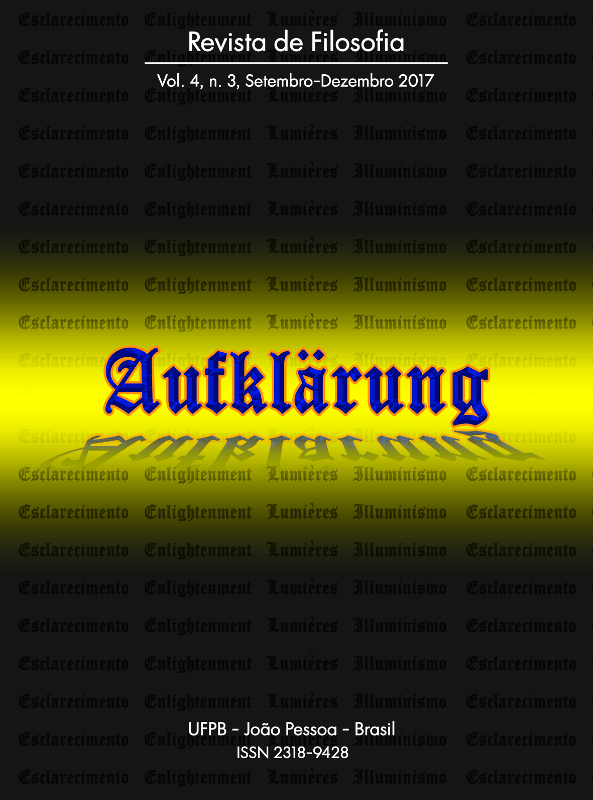Corporalidad y percepción como claves de la crítica Meleau-Pontiana a Bergson
DOI:
https://doi.org/10.18012/arf.2016.36916Keywords:
Merleau-Ponty, Bergson, percepción, corporalidad, memoriaAbstract
El propósito de este trabajo es relevar la importancia crucial de las cuestiones de la corporalidad y la percepción para la comprensión de las múltiples lecturas que Merleau-Ponty realizó de diversos aspectos de la filosofía bergsoniana. El análisis se enfoca en los cursos dictados por Merleau-Ponty en 1947-1948, donde el filósofo advierte la ausencia de una verdadera teoría bergsoniana del cuerpo percipiente, a pesar de las equívocas figuras de una percepción y memoria corporales que Bergson expone en Matière et mémoire. De acuerdo con esta interpretación, estas figuras sólo reiteran en otros términos los mismos problemas del dualismo ontológico y el asociacionismo psicológico que se proponen superar. Se releva además la persistencia invariante de los mismos ejes críticos a lo largo de la entera producción intelectual de Merleau-Ponty, y la perpetuación hasta las últimas obras de Bergson del mismo modelo perceptivo “intelectualista” criticado por Merleau-Ponty.
Downloads
References
AL-SAJI, A. “Merleau- Ponty and Bergson. Bodies of Expression and Temporalities in the Flesh”. En: Philosophy Today, 45 (Supplement), 2001: 110-123.
AL-SAJI, A. “Temporality of Life, Bergson, Merleau-Ponty and the Immemorial Past”. En: Southern Journal of Philosophy, 45.2, 2007: 177-206.
ARANDA TORRES, C. “Reverberaciones bergsonianas en Merleau-Ponty”. En: Daimon. Revista de Filosofía, 44, 2008: 61-72.
BARBARAS, R. “Le tournant de l’expérience. Merleau-Ponty et Bergson”. En Philosophie, 54, 1997: 33-59.
BERGSON, H. Essai sur les données immédiates de la conscience. París: Alcan, 1908.
BERGSON, H. La perception du changement. París: PUF, 2011.
BERGSON, H. L’Énergie spirituelle. París: PUF, 2007.
BERGSON, H. Les deux sources de la morale et de la religion. París: PUF, 1932.
BERGSON, H. Matière et mémoire. Essai sur la relation du corps à l’esprit (MM). París: Alcan, 1903.
CAEYMAEX, F. Sartre, Merleau-Ponty, Bergson. Les phénoménologies existentialistes et leur héritage bergsonien. Hildesheim: Olms, 2005.
FRÈRE, B. “De Bergson à Merleau¬-Ponty. Vers une lecture anthropologique de la mémoire”. En: Revue Interdisciplinaire de Philosophie Morale et Politique, 18, 2001: 267-286.
GINÉS MORALES CAÑAVATE, E. “Cogito y corporalidad: conciencia corporal en Bergson y Merleau-Ponty”. En: Endoxa, 32, 2013: 85-101.
GUTTING, G. “Bergson and Merleau-Ponty on Experience and Science”. En: KELLY, M. (Ed.). Bergson and Phenomenology. Basingstoke: Palgrave Macmillan, 2010, pp. 63-67.
JANKÉLÉVITCH, V. Bergson. París: Alcan, 1931.
MERLEAU-PONTY, M. “Compte rendu du livre de J.-P. Sartre: L’imagination”. En: Journal de Psychologie Normale et Pathologique, 33.9-10, 1936: p. 761-765.
MERLEAU-PONTY, M. La nature. Notes. Cours du Collège de France (N). París: Éditions du Seuil, 1995.
MERLEAU-PONTY, M. La structure du comportement (SC). París: PUF, 1967.
MERLEAU-PONTY, M. Le monde sensible et le monde de l’expression. Cours au Collège de France. Notes, 1953 (MS). Genève: MetisPresses, 2011.
MERLEAU-PONTY, M. Le primat de la perception et ses conséquences philosophiques. Grenoble: Cynara, 1989.
MERLEAU-PONTY, M. L’union de l’ame et du corps chez Malebranche, Biran et Bergson (UAC). París: Vrin, 1978.
MERLEAU-PONTY, M. Le visible et l’invisible (VI). París: Gallimard, 1964.
MERLEAU-PONTY, M. Phénoménologie de la perception (PP). París: Gallimard, 1945.
MORRIS, D. “The Logic of the Body in Bergson's Motor Schemes and Merleau-Ponty's Body Schema”. En: Philosophy Today, 44 (Supplement), 2000: 60-69.
OLKOWSKI, D. “In Search of Lost Time: Merleau-Ponty, Bergson, and the Time of Objects”. En: Continental Philosophy Review, 43.4, 2010: 525–544.
SANTOS MOUTINHO, L. D., “O Labirinto Bergson-Merleau-Pontiano”. En Trans/Form/Açao, 40.2, 2017: 125-138.
SHOICHI, M., “From Miscarried Phenomenology to Intuitive Ontology: Merleau-Ponty’s Reading of Bergson”. En: CHEUNG, C.; YU, C. (Eds.). Phenomenology 2005. Volume 1: Selected Essays from Asia. Part 2, Bucharest: Zeta Books, 2007: 517-534.
SINCLAIR, M. “Is Habit ‘The Fossilised Residue of a Spiritual Activity’? Ravaisson, Bergson, Merleau-Ponty”. En: Journal of the British Society for Phenomenology, 42.1, 2011: 33-52.
SPIEGELBERG, H.. The Phenomenological Movement. A Historical Introduction. The Hague: Martinus Nijhoff, 1965, Vol. II.
TAPINÇ, M. R. “Perception and Time-Experience In Merleau-Ponty and Bergson”. En: Kaygi. Uludağ University Faculty of Arts and Sciences Journal of Philosophy, 23, 2014: 163-184.
TEMPORAL, V. O. “Considerações sobre a crítica de Maurice Merleau-Ponty à concepção de linguagem de Henri Bergson”. En: Anais do Seminário dos Estudantes de Pós-graduação em Filosofia da UFSCar, 2014, 10.
TOADVINE, T. “Nature and Negation. Merleau-Ponty’s Reading of Bergson”. En: Chiasmi International, 2, 2000, pp. 107-117.
WAMBACQ, J. “Maurice Merleau-Ponty’s Criticism on Bergson’s Theory of Time Seen Through The Work of Gilles Deleuze”. En: Studia Phænomenologica, XI, 2011: 233-249.
ZAHAVI, D. “Life, Thinking and Phenomenology in the Early Bergson”. En: KELLY, M. R. (Ed.). Bergson and Phenomenology. New York: Palgrave Macmillan, 2010, pp. 118-133.
ZUNINO, P. “Merleau-Ponty e a bola de neve: elogio e crítica de Bergson”, Cadernos Espinosanos, XX, 2009: 104-120.
Additional Files
Published
How to Cite
Issue
Section
License
Journal general policy
1.This journal works under a Creative Commons License aplied to online journals. That icence can be read in the following link: Creative Commons Attribution 4.0 International (CC BY 4.0).
2.Accordingly to this License, a)the journal declares that authors hold the copyright of their articles without restrictions, and they can archieve them as post-print elsewhere. b)the journal allow the author(s) to retain publishing rights without restrictions.
Metadata Policy for information describing items in the repository
1. Anyone may access the metadata free of charge at anytime.
2.The metadata may be re-used in any medium without prior permission, even commercial purposes provided the OAI Identifier or a link to the original metadata record are given, under the terms of a CC BY license refered for the Journal.







































